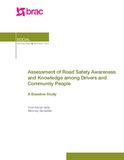| dc.description.abstract | The baseline study was initiated by the Research and Evaluation Division at BRAC, highlighting the aim of BRAC's road safety program to achieve zero fatal road accidents. To understand this dynamic of road accidents with the purpose of preventing its occurrence to a satisfying level, the existing community-centric knowledge was assessed in the study areas. The baseline survey involved participants ranging from community members, students and drivers of both motor and non-motor vehicles. However, the study intends to understand the current status of individual and group level knowledge and attitude of drivers and community members regarding road safety. To map changes over time between baseline and end-term periods, the baseline study conducted between two groups of respondents; such as treatment group (the group was intervened by the program supports) and control groups (the group was independent, not supported by the program). The baseline study found, regardless of the comparison between treatment and control groups, that the vast majority of commercial motor vehicle drivers had no license (80%), almost none of them had received training after the start of their career (90%), and some traffic laws were little learned. Among the non-motor vehicle drivers, 28 per cent possessed a driving license and practically no one in the group had received training. In conclusion, the study revealed that the road safety knowledge of all the groups of respondents was poor. | en_US |

